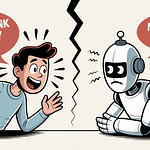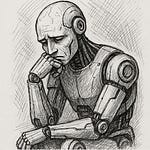Yesterday, as I sat in my home office listening to a rare hail pound against the windows, I heard Dario Amodei's fascinating interview at the Council on Foreign Relations. The soft-spoken CEO dropped quote after quote, each of which could be an article topic. One of his quotes stopped me as cold as the icy pellets dripping down slowly down the windows:
"I think we'll be there in three to six months—where AI is writing 90 percent of the code. And then in twelve months, we may be in a world where AI is writing essentially all of the code."
Not ten years. Not five years. Three to six months.
I glanced around at the remnants of my son's engineering passion filling the inherited room that now makes up my office- a meticulously assembled lunar lander and towering Saturn V rocket. I thought about my nephew's recent layoff from his software engineering position at Boeing. (He loves telling the story of how he can now land an Apache helicopter thanks to that job.) Surrounded by these physical symbols of engineering, I was struck by the clarity that comes from witnessing a paradigm shift unfolding in real time.
Except for a brief stint in advertising back in my NYC days, I’ve worked in high-tech for my entire career. So, I've developed a healthy skepticism toward dramatic predictions. But Amodei isn't your typical Silicon Valley hype man. This is the former VP of research at OpenAI who helped develop GPT-2 and GPT-3 before founding Anthropic. Prior to that, he worked as a Senior Research Scientist at Google Brain. (To this day, I love that name.) When he speaks about AI capabilities, it carries the weight of someone who's been building this future from inside the world's top labs. (Translation: he has some serious street cred.)
I’ve been thinking about the metaphor used by Amodei- how human expertise will persist in "islands" that AI isn't yet good at, before adding: "But on the other hand, I think that eventually all those little islands will get picked off by AI systems."
Not to drown in metaphors, but we're talking islands of human expertise in a rising ocean of AI capability. It raises the question many of us in tech are asking with increasing urgency: which islands will remain above water the longest, and how do we ensure our skills keep our heads above the rising tide?
The 90% Threshold: Are We There Yet?
If you've been coding for any time, you've felt the shifting sands. GitHub Copilot finishes your functions. Claude drafts your API. GPT-4 debugs your errors faster than you can say ‘stack overflow.’ (I don’t usually say things like ‘stack overflow,’ to be honest, but I’ve crashed enough systems to have seen all sorts of strange things flash across my screen.) Here we are, watching as the waterline inches higher, eroding the shoreline of what we once considered securely human territory.
There's something profoundly different about going from "AI helps me code" to "AI writes essentially all of the code." It's the difference between standing in ankle-deep water with firm footing and suddenly swimming in the open ocean. (Hey, Amodei started it with his islands metaphor.)
My nephew Zach spent the last year writing and testing code for the Apache-64E flight simulator at Boeing. It was precise, demanding work requiring technical skill and industry knowledge. When I called to tell him about Amodei's prediction, his first reaction was skepticism. After watching the full interview, he remained defiant—AI would not replace him anytime soon.
Meanwhile, my son Alex is finishing his Master's in Robotics and Automation at Santa Clara University, where he spends his days navigating the intersection of software and physical systems, frequently designing custom parts through rapid prototyping. Alex's university has encouraged students to work with AI, an approach he embraces but doesn't see himself being replaced by AI.
Two different technical professions, same conclusion: "AI will not replace me." They both argued there's a unique value they bring to the table that AI can never replace. Islands or not, they believe Amodei was wrong.
The Human Element
In his interview, Amodei addresses which human elements will persist the longest:
"The programmer still needs to specify, you know, what are the conditions of what you're doing, what is the overall app you're trying to make, what's the overall design decision? How do we collaborate with other code that's been written? How do we have some common sense on whether this is a secure design or an insecure design?"
These highlands of expertise – problem formulation, systems thinking, security assessment, ethical reasoning, and interdisciplinary integration – represent the most complex, context-dependent aspects of engineering work.
In our conversation, Zachary made these same points, highlighting systems security and legacy systems that may be outside an AI's training data.
Alex, a teaching assistant, described a robotics show he's developing with undergrads. While AI has helped prepare the robots, he emphasized that the most essential elements have come from human creativity.
Despite their confidence, Alex and Zach talked about workflows incorporating AI rather than competing with it. As Alex said, "the best possible combination is a human and an AI working together."
Building Bridges Between Human and AI Expertise
The engineers who thrive in the coming years won't be those who try to outcode, outdesign, or outcompute AI systems. They'll be the ones who become effective collaborators, building bridges between islands of human judgment and the powerful capabilities of AI tools.
Amodei himself offers an unexpected insight with his chess analogy:
"I think of, like, human chess champions are still celebrities. You might think when Deep Blue beat Kasparov, and that was almost thirty years ago, that after that it would be, like, chess would be seen as a pointless activity. But exactly the opposite has happened."
Consider that for a moment. Chess engines have been better than humans at chess for decades. Yet human chess hasn't disappeared – it's transformed. We appreciate Magnus Carlsen differently than we appreciate Stockfish 16. We value human chess for its creativity, psychology, and narrative drama, not just for finding the objectively best move.
When New Islands Emerge from the Deep
Zach and Alex are both young men still finding their way in a rapidly changing world. Zach chose a solid profession that he was very skilled at, only to find an AI had suddenly evolved with some of these same skills. Nothing about that replaces him or his unique worth. It just means he keeps evolving. Alex is still in school, learning new skills and searching for new experiences, including a summer internship. He's looking to shape himself into this rapidly evolving job market so there's a place for him when he graduates.
Zach and Alex are family to me, but there are many Zachs and Alexs out there. They represent the islands Amodei was talking about—professionals trying to keep their heads above the rising water. For those of you in similar positions, realize that as AI reshapes the landscape, entirely new domains of expertise will emerge.
My field of writing was one of the first impacted by language models. I never bought into the doomsday hype. I embraced language models from day one and learned everything I could about them. Essentially, I had a love affair with language models and completely reinvented myself as a writer. Now, I'm a writer who helps break down AI concepts. Not only didn't I drown, I'm lounging on one of those comfortable floaties with a drink holder, sipping a piña colada. It's all about how you approach the challenge.
Amodei acknowledges that this transition won't be without difficulties. "I think we're all going to have to have that conversation," he notes when discussing the potential for widespread job displacement. But he also offers this thought:
"I am struck by how meaningful activities can be even when they are not generating economic value. I am struck by how much I can enjoy things that I am not the best in the world at."
Final Thoughts: What Remains Human
As Amodei's timeline for AI-written code unfolds around us, I'm reminded of what I heard from Zachary and Alex when I asked about their five-year visions. Beyond their technical specialties, both expressed the same core aspiration: to build, to create, to make an impact.
The ocean of AI capability rises, but it doesn't rise evenly. The tools of creation may change dramatically, but the creative impulse itself remains stubbornly, magnificently human.
Perhaps this is why Amodei's chess analogy resonates so deeply. When AI surpassed humans at chess, human chess didn't vanish—it transformed. The value wasn't in executing the perfect move, but in the creativity, psychology, and narrative that computers couldn't replicate.
The islands of human expertise will shift in the coming tide. Some skills may submerge while others emerge. But on the highest peaks will stand those who understand that technology has always been about extending human creativity, not replacing it.
When the waters settle, what will matter isn't whether AI writes 90% of the code. What will matter is what we choose to create with it.
This article is a companion to a special “Wolf and Wolf” edition of the "Deep Learning with the Wolf" podcast, featuring a conversation with computer scientist Zachary Wolf and robotics engineer Alex Wolf Torres about the differing impacts of AI across engineering disciplines. Listen to the full episode to hear their perspectives on navigating the changing landscape of technical work.
Contact Zachary Wolf on LinkedIn.
Contact Alexander Wolf Torres on LinkedIn.
Check out this clip of Alex talking about Nvidia RTX 5090.
Next week, there will be unique content and daily updates for Deep Learning Learning with the Wolf as I cover Nvidia GTC.
It will be a thrilling, exhausting, exciting week and I can’t wait.
Come join me!
You can attend GTC in person or watch the virtual sessions for free.
Nvidia GTC is a global artificial intelligence conference for developers that brings together developers, engineers, researchers, inventors, and IT professionals.
I’ve attended every year through the virtual sessions, but this will be the first year I’ve attended in person.
I know the San Jose Convention Center VERY well, though, from having attended NINE comic cons there. I’m figuring it will be much easier to find my way around when I’m not dressed in full stormtrooper armor.
#nvidiagtc #nvidia2025
#darioamodei #anthropic #claude #zacharywolf #alexanderwolftorres #deeplearningwiththewolf #GenerativeAI #AIJobs #FutureOfWork #TechCareers #GenZ #AnthropicAI #constitutionalAI














Share this post